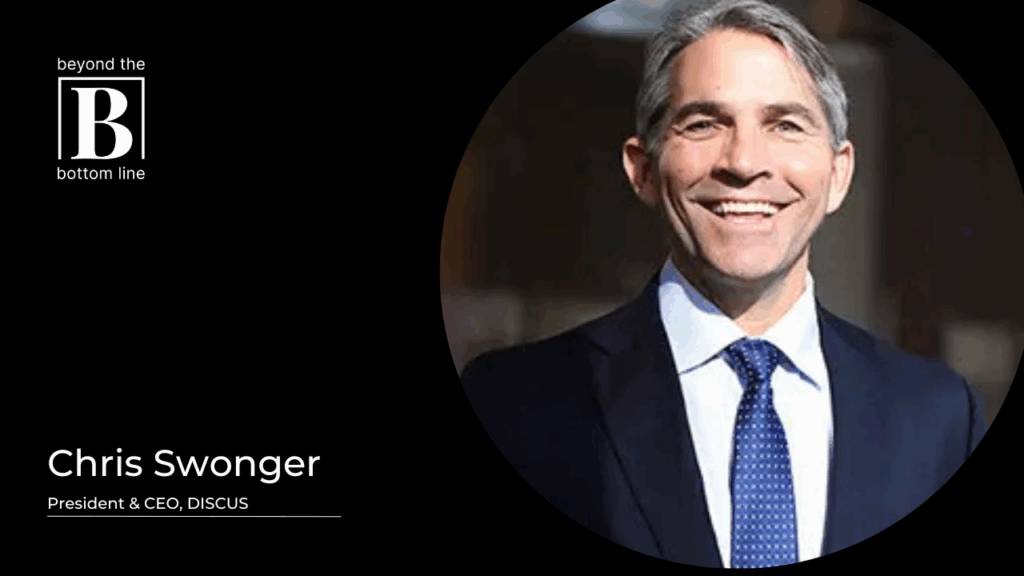Chris Swonger, President & CEO, Distilled Spirits Council of the United States (DISCUS)
Distilled Spirits Industry Leadership: Strategy for a Challenging Market
The distilled spirits industry is navigating one of its most complex moments in decades. After years of steady growth, shifting consumer habits, economic pressures, and intensifying regulatory scrutiny are reshaping how distillers and executives think about the future.
On this episode of Beyond the Bottom Line, Bert sat down with Chris Swonger, President and CEO of both the Distilled Spirits Council of the United States (DISCUS) and Responsibility.org, to explore the challenges facing the sector and the strategies leaders must adopt to sustain growth.
Advocacy at the Core
Since its founding in 1973, DISCUS has been the central voice for U.S. distiller, working on issues from international trade to federal excise taxes. Swonger explained how the council ensures producers can bring products to market without unnecessary barriers, a role that has only grown more critical as the industry contends with geopolitical trade tensions and domestic regulatory shifts.
This advocacy matters not just for the largest producers, but for the entire spirits ecosystem. Grassroots platforms like Spirits United show how companies of all sizes can align on shared policy priorities.
Four Forces Redefining the Market
- Consumer Shifts: How consumers socialize and engage with alcohol has changed dramatically. Legal drinking age consumers—especially Gen Z—are approaching alcohol differently, with many opting for nontraditional occasions and digital-first social experiences. As noted in a recent article on the analysis of Gen Z consumption myths, the old playbook for building loyalty at bars and restaurants no longer applies.
- Economic Pressures: Category growth has slowed, a reversal from the premiumization wave of the pandemic era. Consumers who once traded up are now trading down as discretionary spending tightens. DISCUS’ own economic briefing highlights the headwinds—forcing brands to balance affordability with premium positioning.
- Competition from Alternatives: The rise of cannabis legalization and the growth of cannabis beverages have added new complexity. Meanwhile, ready-to-drink (RTD) spirits are surging.
- Policy and Regulation: From tariffs to state-by-state excise regimes, regulation remains one of the most significant external forces shaping the industry. Swonger emphasized the importance of being proactive: unity and self-regulation are the strongest defenses against reactionary policymaking.
Balancing Heritage with Innovation
The spirits industry carries a cultural weight—bourbon, tequila, scotch, and rum are global icons of heritage. Yet long-term growth depends on innovation. Spirit-based RTDs are a clear example of how legacy and innovation can intersect, marrying tradition with consumer demand for convenience and flavor variety.
As Swonger noted, the industry’s future belongs to leaders who respect heritage while ensuring brands remain relevant for new generations of drinkers.
Why Consumer-Centric Leadership Matters
Today’s consumer-first mindset goes beyond marketing—it’s existential. Brands must:
- Track evolving social and consumption behaviors.
- Innovate responsibly without diluting authenticity.
- Create experiences that resonate emotionally.
As Swonger put it, failing to capture the consumer’s heart and mind means losing relevance.
This extends to responsibility messaging. Through Responsibility.org, the industry is tackling underage drinking, impaired driving, and alcohol misuse head-on. These initiatives aren’t just ethical imperatives; they are strategic ones. In an environment of heightened scrutiny, responsibility becomes a growth enabler, not a box-checking exercise.
The Leadership Imperative
Ultimately, the industry’s resilience will depend on leadership. Economic pressure and competitive disruption test an organization’s culture and talent base. Swonger underscored that difficult times create opportunities for executives with resilience, creativity, and conviction.
For rising leaders, the spirits industry remains one of the most compelling sectors to build a career, where impact is both tangible and cultural.
Final Word
The distilled spirits industry is being reshaped by powerful external forces, but the path forward is clear: unity, innovation, consumer connection, and responsible leadership. As Chris Swonger reminded us, success lies not in resisting change but in steering into it—anchored by advocacy, heritage, and talent capable of meeting the moment.

